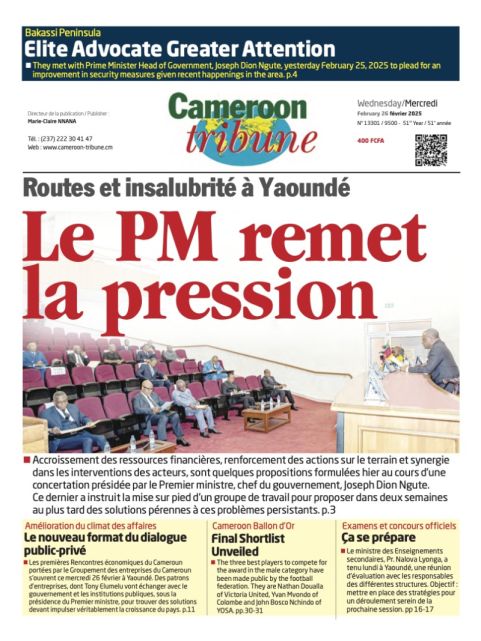Maritime Fishing : Tightening Control Knots
- Par Godlove BAINKONG
- 30 janv. 2023 13:43
- 0 Likes
Cameroon is suffocating under the weight of imports; one of which is fisheries products, and maritime fishing which has all it takes to bail the country out of the quagmire is regrettably proving to be a liability rather than the expected asset. The maritime fishing activity; be it industrial or artisanal, which consists in catching, processing and selling of fish, shellfish, or other aquatic animals is not living up to its billing. The sector is infested with malpractices, ranging from illegal to unregulated fishing that rather bring disgrace to the country.
News early this month that the European Union has banned Cameroonian fisheries products from its markets has been shocking, at least to those who are unaware of malpractices inherent in the sector. In fact, the story goes that the European Union Commission has decided to classify Cameroon as a non-cooperating country in the fight against illegal, unreported and unregulated fishing by giving it a red card. Further details indicate that EU member States will no longer accept the import of fishery products from Cameroon, even if they are accompanied by catch certificates validated by the national authorities. The specific reasons for this decision are based on the EU regulation, which states that only legal fisheries products can enter the EU market. This decision follows a warning issued to Cameroon in 2021, informing it of the possibility of being listed as a non-cooperating country.
While the public awaits a clearly defined mechanism put in place by authorities overseeing the sector in view of reversing the European Union ban, one thing stands out- Cameroon’s maritime fishing is in limbo. In sports like in any domain, sanctions (red card) comes after warning (yellow card). The European Commission issued Cameroon with a ‘yellow card’ warning in 2021, alerting the nation that its fishing fleet was not under control and that insufficient action was being taken to tackle illegal, unreported and unregulated fishing. Apparently, stakeholders didn’t take the warning seriously. It is even reported that since then, additional vessels linked to illegal, unreported and unregulated fishing have been added to Cameroon’s registry, prompting the Commission’s sledge hammer to fall heavily; banning imports of fish from Cameroon until reforms have taken place.
By choosing to align with several other countries that offer “flags of convenience” where companies can, for a fee, register their ships in a nation that has no links to the vessel, Cameroon needed to step up control. From every indication, this has not been the case. According to an article, “How illegal fishing off Cameroon’s coast worsens maritime security” published by ‘The Conversation,’ illegal and unregulated fishing both in industrial and artisanal sectors include: Violation of fishing zones, use of prohibited chemicals, fishing in breeding grounds, non-declaration of catch data, landing of catch in foreign ports and poor regulations and ineffective enforcement of existing laws. It is even said that alongside these criminal practices that are directly related to fishing such as corruption and document fraud, some actors use the fisheries sector and its assets for drug and arms trafficking, illegal immigration and human rights abuses. These are very dangerous crimes! Worse still, both industrial and artisanal fishing are dominated by foreign vessels and crew, lending credence to the fact that Cameroon’s maritime fishing doesn’t fully benefit the people and national economy. Going by a report published by “Equal Justice Foundation”, the significant number of large foreign trawlers flying Cameroon’s flag have brought no real benefit to Cameroon. They have little or no Cameroonian ownership, do not land fish at the country’s ports, and do not appear to employ Cameroonian fishers. All they offer is serious harm to Cameroon’s reputation, alongside a greater risk of illegal fishing and human rights abuses.
More so, experts say illegal and unregulated fishing is also one of the most serious threats to the sustainable exploitation of living aquatic resources and a danger to biodiversity and the marine environment. It’s necessary then to tighten control to safe the vital sector from ruin.
One cannot undermine the efforts of government to reform the sector notably coming up with projects and programmes like the “Livestock and Fisheries Value-chain Development Programme” and the creation of Limbe Nautical Arts and Fisheries Institute. But the danger...
Cet article complet est réservé aux abonnés
Déjà abonné ? Identifiez-vous >
Accédez en illimité à Cameroon Tribune Digital à partir de 26250 FCFA
Je M'abonne1 minute suffit pour vous abonner à Cameroon Tribune Digital !
- Votre numéro spécial cameroon-tribune en version numérique
- Des encarts
- Des appels d'offres exclusives
- D'avant-première (accès 24h avant la publication)
- Des éditions consultables sur tous supports (smartphone, tablettes, PC)











Commentaires